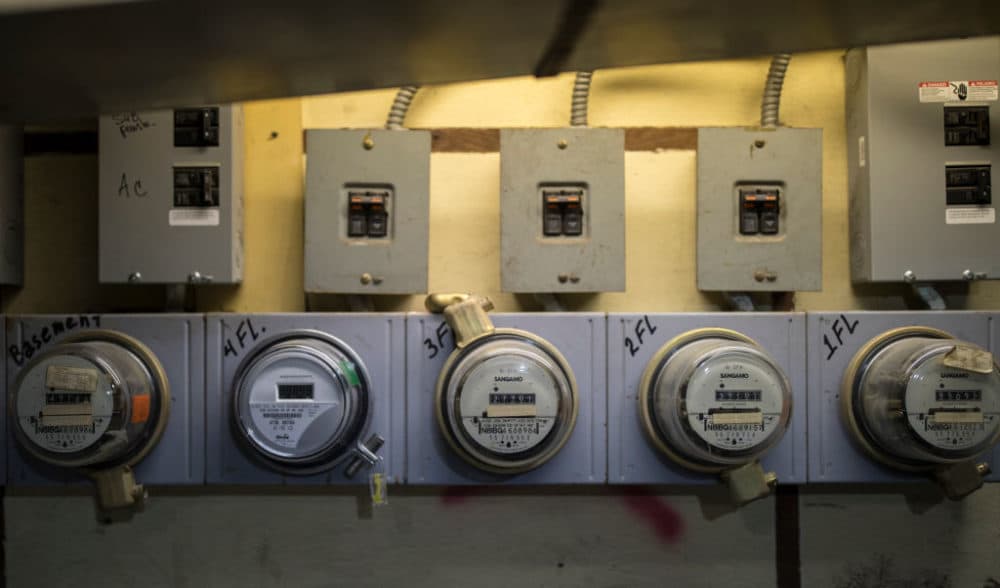Advertisement
'You Could Lose Everything In The Blink Of An Eye': Utility Shutoffs Resume For Overdue Bills
Resume
Stacy Mason boiled water on her stove for bathing and washing the dishes after losing her gas service because of unpaid bills.
During the COVID-19 pandemic, many states put moratoriums on evictions and utility shutoffs that are set to expire next week. But even before those protections phase-out, utility companies are cutting off gas and electric service for people like Mason.
Upset and unable to shower, Mason’s 15 and 17-year-old children didn’t understand why she couldn’t pay the gas bill.
“They knew that I wasn't working,” she says. “But, you know, kids, they don't really understand how hard it is to take care of everything in your home.”
Mason says her bills started piling up after she was laid off in March from her job at an auto plant in Ohio because of COVID-19.
Despite Ohio’s moratorium on utility shutoffs, Mason’s gas company offered to extend her service for one week. She explained that she was laid off and couldn’t make the payment, but she couldn’t work out a deal.
“They knew what my situation was and they still came and they shut it off,” she says. “They didn't knock on the door to let me know beforehand or anything. They just left a paper in my door and shut my gas services off.”
Uncertain of what to do, Mason says she spent much of the first day after the shutoff crying. She reached out to the Ohio Heartland Community Action Commission for help paying the bill.
Mason says she previously reached out to the nonprofit several years ago. She felt embarrassed asking for help but didn’t see another option because of her kids.
With her gas back on, Mason is still struggling. She went back to work for two weeks before getting laid off again — but now she has no income because her unemployment claim hasn’t gone through.
As her bills continue piling up, Mason hopes the nonprofit can help her pay her $800 rent on Sept. 1. If not, she will likely face eviction.
People who aren’t experiencing the economic impacts of the pandemic should feel grateful, she says.
“You get laid off and then all your bills start piling up. You can't pay for gas or food or even pay your mortgage or your rent,” she says. “And it can happen in the blink of an eye.”
Mason works with center director Tracey Rector at Ohio Heartland Community Action Commission, which aims to help low-income people break cycles of poverty. Rector says Mason’s story is not uncommon in central Ohio.
“Our phone simply does not stop ringing,” she says.
When Rector called Mason’s gas company, the representative said the shutoff was a mistake. The representative said the company plans to start disconnecting customers in September based on bills for August, Rector says.
Like Mason, many people feel embarrassed about asking for help, Rector says. The four staffers try to ease people’s fears and understand their struggle, she says,
The nonprofit first addresses people’s immediate needs, such as Mason’s gas. Then, staffers ask if they can help in other ways such as utility bills, rent or gasoline to drive to doctor’s appointments or school, Rector says.
The organization makes direct payments to utility companies or landlords rather than giving clients the money, she says. Staff call utility companies from a different number than customers, and review clients’ payment history and balance.
Many folks are put on a percentage of income payment plan, or PIPP, which matches their bill to their income over their usage, she says.
The Ohio Heartland Community Action Commission finds different ways to help people based on their individual situation, Rector says.
One man called in saying he needed help with a car payment or he would lose his job. The organization can’t make car payments, so instead, Rector offered to pay his rent so he could afford it himself.
“We just really try to listen and see what it is,” she says. “If we can't do it is there another resource in our community who can? Or what can we do to connect dots and make it happen for folks?”
With utility moratoriums close to expiring, Rector says she’s concerned. The organization has helped people pay electric bills through its summer crisis program but doesn’t have enough money to do the same with gas.
Compared to before COVID-19, people need much more help with rent because the moratorium expired a couple of months ago, she says. And she expects to see more people who need help with utilities.
People are now experiencing the brunt of this economic crisis since the additional $600 per week in unemployment expired, she says. Now, people feel greater pressure to get back to work — and many need to find new jobs.
“Here in our community, several companies, restaurants, different things have just simply closed and their people are never gonna go back to work at that location,” she says. “So that is scary for everybody.”
Chris Bentley produced and edited this story for broadcast with Tinku Ray. Allison Hagan adapted it for the web.
This segment aired on August 24, 2020.

